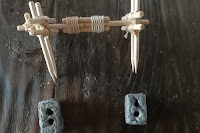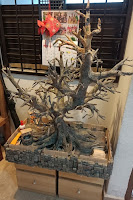Often, this is not a deliberate choice, more a matter of circumstance. Perhaps a programmer started on QBasic as a kid. Perhaps, like me, the programmer picked it up in school and was made to learn C++ or Java. I would even venture to say very few programmers start out saying I'm going to begin my programming journey with the best, most modern language out there! To begin with, how would they know what constitutes the "best" programming language, or what even is a good programming language? You don't know what you don't know, after all.
 |
| Let's learn! |
Also, how suitable a programming language is for your purposes also really depends on what your purpose is. Do you want to crunch data? Write games? Build web portals?
So, obviously, before we can sort out what the "best" programming language is, perhaps it is more useful to figure out what a programmer's first programming language should be. After all, this choice opens different doors.
For that, we should probably look at a few factors. I can only draw upon languages I've coded in before. as examples, obviously.
Syntax
For this, we look at simplicity of writing code in that language. How intuitive the syntax is, and how few extra keystrokes needed to get something done.For this, my obvious picks would be Python or Ruby. Less of the semi-colons and curly brackets. Anyone picking either Python or Ruby as a first language, I suspect, would be less likely to give up out of frustration.
 |
| Code syntax. |
C# and Java is probably among the worst for this. Too many namespaces. Overly verbose syntax. I haven't had many projects that needed to be done in either of these languages, and for that I'm truly grateful.
But the one that takes the proverbial cake, in terms of being cumbersome, would be PHP. The function calls structures are wildly inconsistent, and in addition to semi-colons and curly brackets, it also requires a dollar sign preceding every variable name.
As far as syntax goes, the group of programming languages with visually similar styles - PHP, Java, JavaScript, C and its variants - is such that if you pick one up, the learning curve for the others, at least for the simple stuff, isn't so great. Thus, even if PHP is hideously cumbersome in parts, it benefits from being visually similar to other languages mentioned.
Transferable skills
This measures underlying principles or skills that one will pick up while programming in a certain language, that will be useful when transitioning to another stack. It could be something as simple as similar syntax (as mentioned earlier) or strong data typing.Or it could be something so ubiquitous that no matter what stack you're in, you're almost certainly going to encounter it. A great example of this would be SQL. No matter what kind of programming you go into, the chances of you needing to access a database at some point, are pretty good. I wouldn't go so far as to say that this makes SQL the number one choice for a programmer's first language, but it makes a great case for being a programmer's second, at least.
 |
| Data processing. |
For a similar reason, if one wanted to go into web development, it's almost impossible not to have to deal with HTML, CSS and JavaScript, but learning JavaScript as a first language just for that, is questionable. As a second language, definitely.
Strongly-typed, class-based languages such as Java and C# would be good choices as a first programming language for learning concepts such as Object-Oriented Programming. (PHP and JavaScript kind of implement OOP as well, but in a way that's a little odd). Python would be the choice if one wanted to have a strong foundation in data structures. However, Python's lack of strong typing might work against it as a first language.
Ease of setup
One of the most daunting tasks of learning a language is setting up the environment for it. Java requires the JRE (Java Runtime Environment). PHP requires an Apache server. Python and Ruby, well, you get the idea.For this, the most fuss-free option has to be JavaScript, hands down.
 |
| All major browsers run JavaScript. |
JavaScript runs on all major browsers. You don't need to install anything you probably don't already have. If you're reading this, unless you're reading it on your phone, you have a desktop browser which you can run JavaScript in. It's almost zero setup. Just write your code, and run it in the browser.
For a Windows environment, VBScript is also almost zero effort. All you need to do is write your script, save it with extension "*.vbs" and you can run it by double-clicking it! Unfortunately, I'm not sure how useful knowing VBScript is.
In essence, in the cases of both JavaScript and VBScript, the environment has already been set up for the programmer.
Popular support
No developer plies their trade without consulting a reference of some sort. Textbooks are a valid source, but for the most updated material, we turn to the internet. Portals and forums provide most of these, with each language having large communities of programmers ready to provide support. |
| Learn by reading, or by community. |
Which programming language has the largest, or best, communities?
That's hard to say. All communities have their fair share of toxic losers who waste little time being condescending and acting like gatekeepers. At the same time, each community also boasts genuine people. I'm not going to waste time detailing how large each programming language's community is relative to others. Suffice to say, they're all (OK, mostly) large enough to be useful.
Generally, the longer they have been around, the larger they tend to be.
Conclusion
Whatever the choice turns out to be, ultimately, there will be benefits to that choice. That is because no matter what language someone chooses for their first programming experience, the fact remains is that they are still engaging in the activity of programming. It's a start. Some starts are better than others, sure, but it's a step. And hopefully the first of many.Mind your (first) language!
T___T
T___T











































